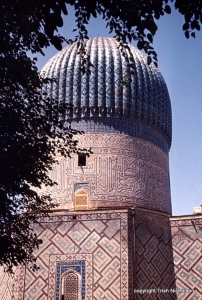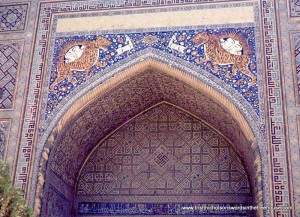 We were ‘global’ thousands of years before air travel and international corporations, or as far as the ‘globe’ was known which amounts to the same thing in courage and curiosity.
We were ‘global’ thousands of years before air travel and international corporations, or as far as the ‘globe’ was known which amounts to the same thing in courage and curiosity.
I’ve been away from the blog for a while, working like a dervish on the magnum opus, but that is growing apace, so to give me a break, I will share with you some of the weird and wonderful true tales accumulated on the way. This is the first in a new series on great travellers, presented in no particular order.
The impulse to travel beyond the known is probably in our DNA since Homo sapiens migrated out of Africa around 200,000 years ago – a migration that lasted thousands of generations and the journeying has never stopped. The ultimate destination is, perhaps, not a physical one. We can leave that thought hovering on the horizon.
Our first traveller is Al-Mas’udi, a native of Baghdad born sometime before 893 CE (280 HA in the Muslim calendar), of no fixed address because he was perpetually ‘on the road’ or, more likely, on a camel, especially when following the vast network of trading lanes that made up the Silk Route. He travelled north as far as the Caspian Sea, Azerbaijan and Armenia; east through Persia; south to Egypt, India, Ceylon (Sri Lanka) and the African coast to Zanzibar, and west to Syria and the Mediterranean.
But Al-Mas’udi was also a scholar and something of a journalist. He didn’t simply bum around. He wrote twenty books, for those covering the history, geography and culture of the places he visited, he gleaned information from merchants, locals he met along the way, and other scholars as well as reports of earlier travellers. He reveals the cosmopolitan nature of cities: in the Khazar Kingdom, different supreme judges specialise in resolving disputes according to the various laws of Moslem, Christian, Khazar, or pagan residents.

Books were rare and expensive in Europe, but Baghdad was ‘book-city’ with over 100 bookshops because it operated its own paper factory. Developing techniques the Arabs had learnt from China, they mass produced cheap writing materials, making possible a burgeoning publishing industry of hand-copied manuscripts preserving for us much scholarship of the time.
Al-Mas’udi’s works received limited attention during his lifetime because he never mastered the art of being concise – 130 chapters and thousands of pages in a single volume proved too daunting for most readers – although he did edit and condense some of his works later in life. His most famous travelogue, Meadows of Gold and Mines of Gems (‘Murūj al-dhahab wa ma’ādin al-jawāhir’), amounts to a world encyclopaedia.
Even games are included – in this extract on the reign of el-Bajbud, a Hindu king in India:
In his reign the game of tables or backgammon was invented. This game shows how one obtains gain, for it is neither the result of sagacity and contrivance, nor is subsistence earned by cleverness in this world…The dice are meant as symbols of fate and the way in which it deals with mankind; for the player who is favoured by luck, will attain in this game what he wishes, whilst the clever and provident is less lucky than another, if the other is favoured by fortune; for gain and good fortune are a mere chance in this world.
Then succeeded [king] Balhit. In his reign the game of chess was invented, and he recommended the play in preference to backgammon, pointing out that the clever is the winner, and not the idiot.
And a tough alternative to Eton and Cambridge as a route to the upper echelons of the civil service:
In China eunuchs are appointed in the revenue department and other offices: some parents, therefore, castrate their children, in order that they may rise to power.
Among other detailed observations is that the best musk (an ingredient of perfume and extremely valuable item of trade) comes from Tibet where musk deer feed on aromatic herbs, the essence exported in the bladder in its natural state. Chinese musk is of inferior quality because they adulterate it to make it go further and then bottle it.
He quotes a Hindu poem on the advisability of breaking wind freely whenever the need arises ‘for restraint is unwholesome’. Though perhaps less so for one’s near companions.
In the mountains of Central Asia, man-like monkeys covered in hair are kept by the Tartar kings to test their food for poison, which the monkeys can smell.
And a famous war elephant in Kashmir called Monkirkals, was leading eighty elephants from their stable through the outskirts of the city when a woman, surprised by their appearance in a narrow lane, fell over backwards. Monkirkals turned to block the road to protect her from the elephants following him, and helped her up with his trunk.
Among the geographical and historical information, much of it accurate in advance of his time, Al-Mas’udi quotes myths, hearsay, and vignettes of kings and their misdeeds worthy of The Arabian Nights.
But one of the most useful quotes is the warning at the beginning of his book:
Whosoever changes in any way its meaning, removes one of its foundations, corrupts the lustre of its information, covers the splendour of one paragraph, or makes any change or alteration, selection or extract; and whoever ascribes it to another author, may he feel the wrath of God!
And he goes on at length describing what terrors he hopes that wrath might entail. I have taken care to give due credit.
Extracts from Meadows of Gold are from an English translation by Aloy Sprenger, M. D., if you wish to read more, it is available online here.

What fun you are having, researching travellers like this! I so enjoyed this post – and look forward to more like this.
Hello Jo, yes, I am having a great deal of fun researching for the ‘magnum opus’, stories are into everything and involve so many intriguing people and places – the hardest part is not be carried off on a runaway camel to fascinating but not quite relevant sidetracks.